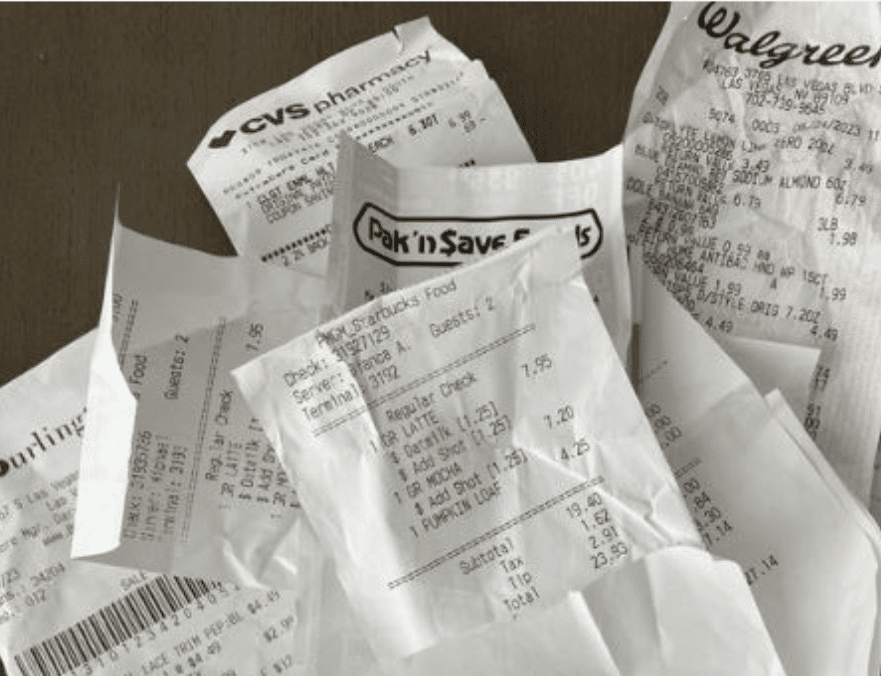If at first you don’t succeed… a California lawmaker is trying again to restrict paper receipts, in a move that could have some cost consequences for couponers.
Three years after his bill first failed to become law, Democratic state Assemblyman Phil Ting of San Francisco has reintroduced a measure that would prohibit businesses from providing paper receipts except upon request. The bill has now advanced to the state Senate, after passing in the state Assembly.
But the bill would do more than just restrict receipts. It would also prohibit any receipt that is printed, “from including items not essential to the transaction, including, but not limited to, coupons or advertisements.”
That would mean no coupons printing at the bottom of your CVS receipt, or ads on the back of your grocery receipt – if you even get a receipt at all. It would also mean not having a physical receipt to scan and submit to cash-back apps like Ibotta that don’t accept e-receipts for in-store purchases.
That’s a small price to pay for saving the Earth, Ting argues.
“In this digital age, customers should have options,” the lawmaker said in a statement. “It doesn’t make sense to kill so many trees and produce billions pounds of carbon emissions when we buy a cup of coffee or a pack of gum.”
Ting cited research from the environmental group Green America, which found that each year, the U.S. uses more than 3 million trees and 10 billion gallons of water to create paper receipts, in a process that generates more than 300 million pounds of waste and 4 billion pounds of carbon dioxide.
“Unwanted and often immediately discarded paper receipts are a wasteful use of our natural resources,” Californians Against Waste Legislative Director Nicole Kurian said in response to Ting’s bill, which “simply updates common proof-of-purchase practices by allowing consumers to choose more environmentally friendly alternatives.”
The original version of what Ting calls the “Skip the Slip” bill also passed the state Assembly back in 2019 but died in the Senate Appropriations Committee. This time around, the revived bill passed the Assembly last month and is now being considered in the Senate Environmental Quality and Judiciary committees, where it’s due for its first hearing later this month.
Some business groups have expressed concerns about the bill and its consequences. A coalition consisting of the California Chamber of Commerce, the California Restaurant Association, the California Retailers Association and the California Grocers Association called out “several problematic provisions” in the bill. Retailers that check receipts as customers exit their stores in an effort to combat theft will no longer be able to do so, they argue. Some businesses don’t have the ability to provide e-receipts, and/or don’t want to collect customer information like e-mail addresses due to privacy concerns.
And the related ban on receipt coupons “raises constitutional questions” as a “limit of commercial speech,” the groups argue. The “anti-consumer” provision “will harm those who use coupons to save money on essential grocery and other items.”
Even some supporters of the bill have expressed some concerns about the coupon-related provisions. “Nothing in this bill will prohibit businesses from printing coupons and other information separate from receipts for their customers,” the Assembly Committee on Privacy and Consumer Protection noted during a hearing earlier this year. “So, while the author’s stated goal of shortening receipts will technically be achieved, the goal of reducing paper waste will not.”
More retailers are moving toward digital coupons, though, as opposed to coming up with more ways to print coupons at the checkout. And Ting noted that some retailers are already shortening their receipts, and his bill is aimed at encouraging others to do the same. “CVS – known for their notoriously long receipts – added a prompt at check out last year, allowing customers to pick between no receipt, an e-receipt or a paper receipt,” he said. “Whole Foods’ receipts are 50 percent shorter than they were three years ago.” And Albertsons, which has more than 100 stores in California, briefly printed coupons at the bottom of customers’ receipts several years ago as part of a partnership with Quotient Technology, until the partners parted ways and the initiative came to an end.
Under an amended version of the bill, only businesses with annual revenues over $25 million would be required to comply. Those that don’t, could be fined $25 per day, up to a maximum of $300 per year.
“Our unwanted paper receipts contribute to unrecyclable litter and expose us to toxic endocrine disruptors such as BPA,” Californians Against Waste policy associate Chloe Brown said. “By simply offering consumers alternatives, we can stop a completely unnecessary and wasteful use of our natural resources.”
Some might argue, however, that the real waste could be the extra money they’re forced to spend, after losing access to coupon savings and cash-back earnings. Restricting receipts and banning receipt coupons may help save the environment – but for couponers, it could come at a cost.
Image source: California Assemblymember Phil Ting















It would also put Catalina out of business, other than “on your next order” coupons printed as a result of items you purchased.
Not sure how it would affect coupons printed on the back of the receipt since it’s the same amount of paper, although fewer people might get it. Or maybe the wording needs to be fixed.
It says that this would NOT apply to coupons printed separately from the receipt, so that sounds like Catalina type things would be fine, just not coupons ON the receipt (like CVS). Also would not appear to impact CVS having the machines where you can print coupons (which makes sense, as those are totally voluntary to the customer).
So, in reality, there would be no difference at all, save that those who want or need the receipt would have to ask for it.
Not like they are prohibiting it totally.
Coupons and ads and anything else that would lengthen a receipt, or cause more ink or other resources to be used, would be prohibited regardless of whether one asks for a paper receipt. Otherwise digital receipts will become the default, and you won’t be asked what kind of receipt you want, you’ll get a digital receipt unless you specifically request a paper one, which they’re likely betting that few people will do.
However, it says that they CAN still offer those coupons printed SEPARATELY, so if they want to have them, there is still a way to do them.
And many stores already prompt to ask what kind of receipt, so that would still work (as that way they are only providing a paper one IF THE CUSTOMER REQUESTS IT by pushing that button).
The point being, what is suggested in the story (that people will have to pay more since they can’t get refunds from the various programs without a printed receipt or can’t get coupons when they want them) is NOT the case – both will still be available to anyone who desires to have them.